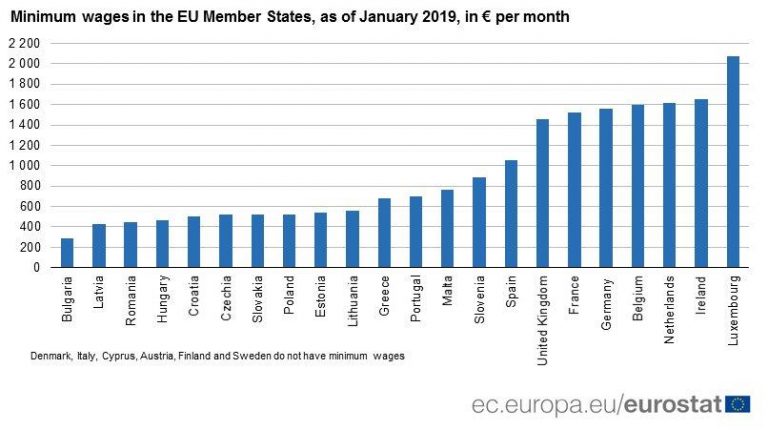 Romania ranks second to last among EU states in terms of national gross minimum wage, according to data published by Eurostat, at a level of EUR 446.
Romania ranks second to last among EU states in terms of national gross minimum wage, according to data published by Eurostat, at a level of EUR 446.
Bulgaria (EUR 286) and Latvia (EUR 430) are behind us and former colleagues from the socialist bloc Hungary (EUR 464), Croatia (EUR 506), the Czech Republic (EUR 519), Slovakia (EUR 520), Poland (EUR 523), Estonia (EUR 540) and Lithuania (EUR 555) are ahead of us.
A group of five states, located closer to the south of the continent, have minimum wages ranging from EUR 650 to EUR 1,050 (Greece – EUR 684, Portugal – EUR 700, Malta – EUR 762, Slovenia – EUR 887 and Spain – EUR 1,050).
The other states, located in the western and northern parts of the EU, uses salaries over EUR 1,450, with the lowest level within the group in the UK (EUR 1,453).
France (EUR 1,521), Germany (EUR 1,594), the Netherlands (EUR 1,616) and Ireland (EUR 1,656) appear above it and the highest value, and the only one above the EUR 2,000 threshold is recorded in Luxembourg (EUR 2,071).
Please note that only 22 of the 28 EU member states have national minimum wages established by law (countries that do not use this tool are Denmark, Italy, Cyprus, Austria, Finland and Sweden).
Minimum wage – related to purchasing power
In order to have an international reference, Eurostat mentioned that the national minimum wage in the US, in January 2019, was EUR 1,098, slightly higher than in Spain and significantly lower than in other major Eurozone economies.
It should also be noted that the level of prices varies significantly between countries, which makes the salary deviation significantly lower in reality than it appears to be based on the values expressed in euros.
In the EU, based on the standard purchasing power parity (PPS), the difference between the maximum and the minimum level reduces to less than half from 7.2 to 1 to only 2.96 to 1 (Luxembourg 1.646 PPS and Bulgaria 557 PPS).
Evolution over last five years
The evolution of the national gross minimum wage in Romania, as it appears in the Eurostat data at the semester level in each of the last five years, is presented in the table below, with the mention that there is a comparability break in this series between S2 2017 and S1 2018, following the transfer of tax contributions from the employer to employee (atypical for the EU countries), which somewhat artificially increased the gross minimum salary.
*
- Evolution of national minimum gross salary in Romania
- Semester
- Minimum gross salary
*
Of course, the value taken into account for the EUR / RON exchange rate has in the meantime increased above the one used by Eurostat for the first semester of 2019, but the difference is not too high and maintains Romania’s position in the European ranking (about EUR 438 at a rate of 4.75 RON / EUR instead of 4.66 RON / EUR, at the value of RON 2,080 set earlier this year).
It can also be noticed that the national minimum wage would rise in 2019 compared to 2018 by only slightly more than 9% in the values expressed in euro. That is, below the expected level, also expressed in euros, of the increase in the national gross average wage forecast by CNSP (14%, from RON 4,502 at an average exchange rate of 4.6535 RON / EUR, to RON 5,163 at an average exchange rate of 4.67 RON / EUR)
Finally, very importantly, the level of taxation of the minimum gross wage differs considerably from the other European countries, which makes the real position of a Romanian employee with a minimum salary to be the penultimate in the EU, with EUR 271 in our case, compared to EUR 309 in Hungary and EUR 352 in Latvia.
More suggestively, if we compare the net minimum wages earned by employees, we are at 88% compared to Hungary, 77% compared to Latvia (which appears slightly below in terms of gross minimum wage) and 72% to Poland (where the net minimum wage is EUR 379), but we mark a level of + 22% compared to EUR 222 in Bulgaria.











